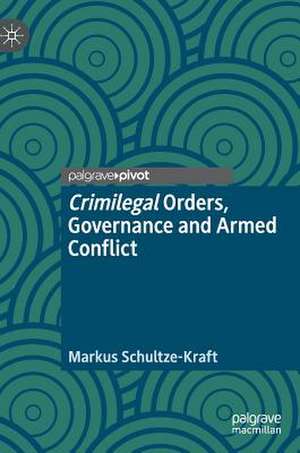Crimilegal Orders, Governance and Armed Conflict
Autor Markus Schultze-Kraften Limba Engleză Hardback – 22 ian 2019
Preț: 421.34 lei
Nou
Puncte Express: 632
Preț estimativ în valută:
80.62€ • 87.85$ • 67.94£
80.62€ • 87.85$ • 67.94£
Carte tipărită la comandă
Livrare economică 23 aprilie-07 mai
Preluare comenzi: 021 569.72.76
Specificații
ISBN-13: 9783030034412
ISBN-10: 3030034410
Pagini: 154
Ilustrații: XIX, 201 p. 10 illus.
Dimensiuni: 148 x 210 mm
Greutate: 0.42 kg
Ediția:1st ed. 2019
Editura: Springer International Publishing
Colecția Palgrave Pivot
Locul publicării:Cham, Switzerland
ISBN-10: 3030034410
Pagini: 154
Ilustrații: XIX, 201 p. 10 illus.
Dimensiuni: 148 x 210 mm
Greutate: 0.42 kg
Ediția:1st ed. 2019
Editura: Springer International Publishing
Colecția Palgrave Pivot
Locul publicării:Cham, Switzerland
Cuprins
1. Introduction.- 2. Crimilegal Order: What's Behind a Term?.- 3. Mobbed-Up, Corrupt or Crimilegal Orders?.- 4. Instances of Crimilegality in Colombia and Nigeria.- 5. Governance and Violence in Crimilegal Orders.- 6. Overcoming Armed Conflict in Crimilegal Orders.- 7. By Way of Conclusion: Taking the Research on Crimilegality Forward.
Notă biografică
Markus Schultze-Kraft is Associate Professor in the Department of Political Studies at Universidad Icesi, Colombia.
Textul de pe ultima copertă
“A major contribution to the literature. The book adds an important facet to the discourse on organized crime and illegal governance.”
—Klaus von Lampe, John Jay College of Criminal Justice, CUNY, USA
“Markus Schultze-Kraft's impressive new book on crimilegal orders explores the interface between politics, organised crime and violence and develops a theoretically sophisticated analysis of how state legality works and for whom in a globalised world.”
—Robin Luckham, Institute of Development Studies, University of Sussex, UK
“This is an important book that makes an excellent contribution to understanding how criminality affects governance.”
—Paul Jackson, International Development Department, University of Birmingham, UK
“Schultze-Kraft’s efforts to demystify the grey zones of the 'crimilegal order' are illuminating and will be invaluable for scholars.”
—Ivan Briscoe, International Crisis Group, Colombia
Comprehensively laying out the concept of crimilegality, this book presents a novel perspective on the relationship between what is conventionally termed organised crime and political order in the contemporary developing world. In hybrid crimilegal orders the moral, normative and social boundaries between legality and illegality-criminality are blurred, and through the violation of the official law, the illegal-criminal sphere of social life becomes legitimate and morally acceptable, while the legal turns illegitimate and immoral. Several examples of crimilegality and crimilegal governance in Colombia and Nigeria, including in relation to armed conflict termination, are used to illustrate these complex processes.
Markus Schultze-Kraft is Associate Professor in the Department of Political Studies at Universidad Icesi, Colombia.
—Klaus von Lampe, John Jay College of Criminal Justice, CUNY, USA
“Markus Schultze-Kraft's impressive new book on crimilegal orders explores the interface between politics, organised crime and violence and develops a theoretically sophisticated analysis of how state legality works and for whom in a globalised world.”
—Robin Luckham, Institute of Development Studies, University of Sussex, UK
“This is an important book that makes an excellent contribution to understanding how criminality affects governance.”
—Paul Jackson, International Development Department, University of Birmingham, UK
“Schultze-Kraft’s efforts to demystify the grey zones of the 'crimilegal order' are illuminating and will be invaluable for scholars.”
—Ivan Briscoe, International Crisis Group, Colombia
Comprehensively laying out the concept of crimilegality, this book presents a novel perspective on the relationship between what is conventionally termed organised crime and political order in the contemporary developing world. In hybrid crimilegal orders the moral, normative and social boundaries between legality and illegality-criminality are blurred, and through the violation of the official law, the illegal-criminal sphere of social life becomes legitimate and morally acceptable, while the legal turns illegitimate and immoral. Several examples of crimilegality and crimilegal governance in Colombia and Nigeria, including in relation to armed conflict termination, are used to illustrate these complex processes.
Markus Schultze-Kraft is Associate Professor in the Department of Political Studies at Universidad Icesi, Colombia.
Caracteristici
Provides innovation in terms of its conceptual-theoretical contribution to the relationship between criminality, governance and armed conflict Based on in-depth field work in Colombia and rich primary and secondary source material from a range of other country cases Has multi-disciplinary appeal and speaks to both academic audiences from a number of social science disciplines and a range of specialized practitioners, including law enforcement professionals and specialized bilateral and multilateral organizations
